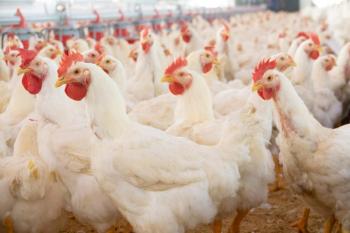
AU professor develops egg-injected poultry vaccination against avian influenza
Auburn, ALA. - 12/05/2006 - An Auburn University veterinary professor, in collaboration with researchers at Vaxin Inc. of Birmingham, has developed the first in ovo vaccine to protect chickens against avian influenza.
AUBURN, ALA. - 12/05/2006 - An Auburn University veterinary professor, in collaboration with researchers at Vaxin Inc. of Birmingham, has developed the first in ovo vaccine to protect chickens against avian influenza. Dr. Haroldo Toro, whose research is in the scientific journal, Vaccine, says it would provide 100 percent protection once an outbreak's strain is determined.
“We have proven the principle, which is the major step in leading to commercially produced vaccine that could be vital to the poultry industry,” Toro says. “When an outbreak occurs, we would determine the strain and quickly create a vaccine within three months specifically for it.”
The researchers inserted a gene from a low pathogenic avian flu virus strain (H5N9) into a non-replicating human virus, a Vaxin proprietary technology, which was then injected into developing chicken embryos still in the egg. When protection induced by the vaccine was tested against two highly pathogenic avian flu viruses, a Vietnam H5N1 strain and a Mexican H5N2 strain, the results showed 68 percent and 100 percent protection, respectively.
“These strains have slightly different genetic makeups which account for the different percentages in protection,” says Toro, who is also collaborating on this project with the Southeast Poultry Research Laboratory in Athens, GA. “Our results indicate that we can provide effective protection against any strain after incorporating the gene of the field strain into our vaccine construct.”
The current policy of health officials during an outbreak of highly pathogenic avian flu is mass euthanasia and disposal of infected birds, and strict biosecurity measures. Mass vaccination programs around the perimeter region would help to reduce the risk of further dissemination of the field virus to neighboring areas. Because this vaccine also allows easy differentiation between naturally infected birds and vaccinated birds, this new vaccine could also be used to prevent outbreaks of disease in case of immediate risk from a known strain affecting, for example, neighboring countries.
Toro's research is funded through a USDA program set up in 2004 for universities to study avian influenza. The next step is gaining federal approval to commercially produce the vaccine.
“We are looking at two or three years for federal approval, but it might be much sooner if an outbreak occurs,” he says. “We have a very good tool against avian flu. No one has done this before.”
Newsletter
From exam room tips to practice management insights, get trusted veterinary news delivered straight to your inbox—subscribe to dvm360.






